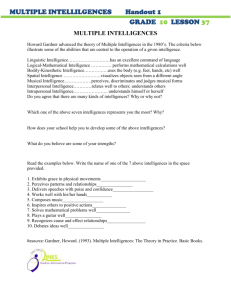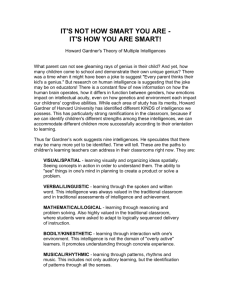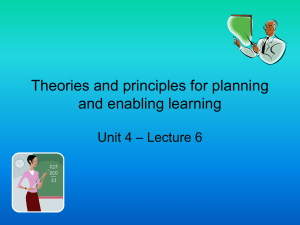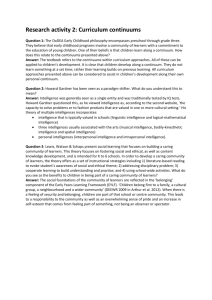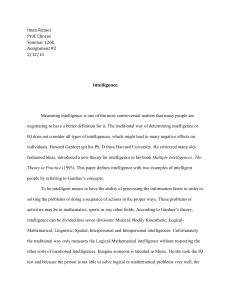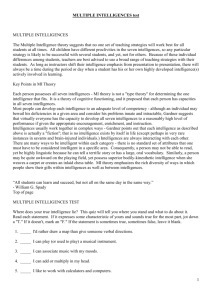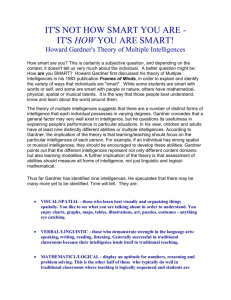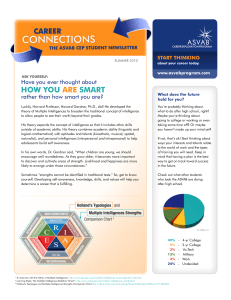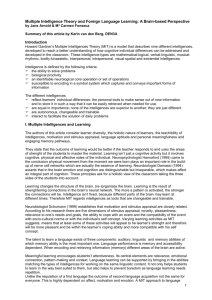The multiple intelligence was proposed by Howard Gardner
advertisement
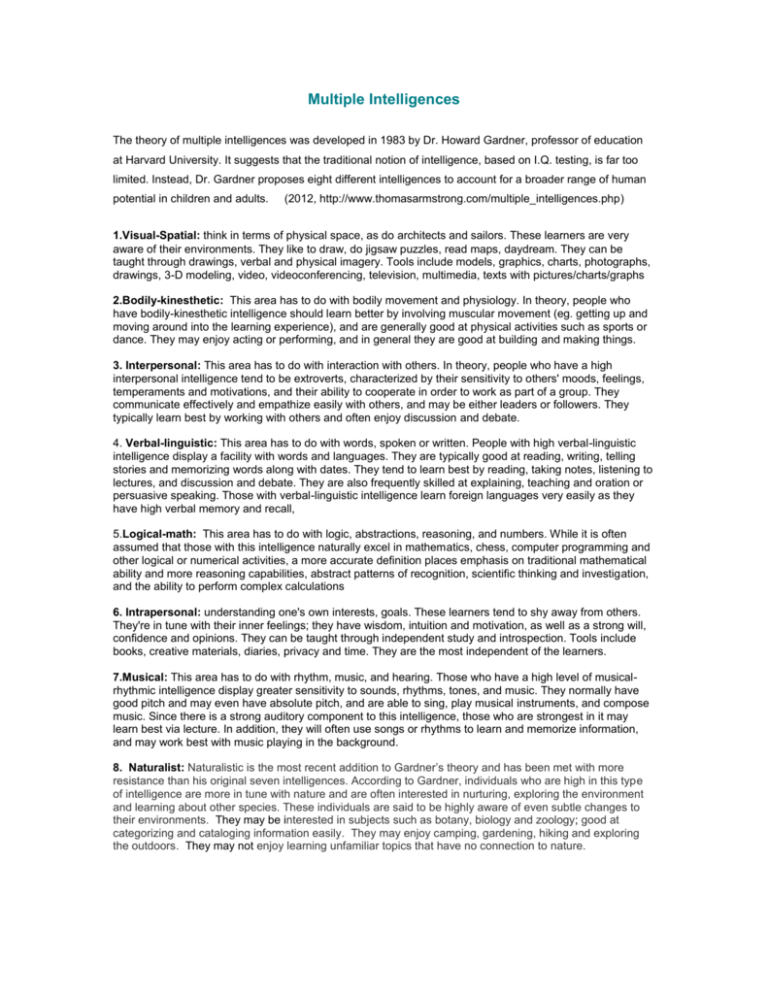
Multiple Intelligences The theory of multiple intelligences was developed in 1983 by Dr. Howard Gardner, professor of education at Harvard University. It suggests that the traditional notion of intelligence, based on I.Q. testing, is far too limited. Instead, Dr. Gardner proposes eight different intelligences to account for a broader range of human potential in children and adults. (2012, http://www.thomasarmstrong.com/multiple_intelligences.php) 1.Visual-Spatial: think in terms of physical space, as do architects and sailors. These learners are very aware of their environments. They like to draw, do jigsaw puzzles, read maps, daydream. They can be taught through drawings, verbal and physical imagery. Tools include models, graphics, charts, photographs, drawings, 3-D modeling, video, videoconferencing, television, multimedia, texts with pictures/charts/graphs 2.Bodily-kinesthetic: This area has to do with bodily movement and physiology. In theory, people who have bodily-kinesthetic intelligence should learn better by involving muscular movement (eg. getting up and moving around into the learning experience), and are generally good at physical activities such as sports or dance. They may enjoy acting or performing, and in general they are good at building and making things. 3. Interpersonal: This area has to do with interaction with others. In theory, people who have a high interpersonal intelligence tend to be extroverts, characterized by their sensitivity to others' moods, feelings, temperaments and motivations, and their ability to cooperate in order to work as part of a group. They communicate effectively and empathize easily with others, and may be either leaders or followers. They typically learn best by working with others and often enjoy discussion and debate. 4. Verbal-linguistic: This area has to do with words, spoken or written. People with high verbal-linguistic intelligence display a facility with words and languages. They are typically good at reading, writing, telling stories and memorizing words along with dates. They tend to learn best by reading, taking notes, listening to lectures, and discussion and debate. They are also frequently skilled at explaining, teaching and oration or persuasive speaking. Those with verbal-linguistic intelligence learn foreign languages very easily as they have high verbal memory and recall, 5.Logical-math: This area has to do with logic, abstractions, reasoning, and numbers. While it is often assumed that those with this intelligence naturally excel in mathematics, chess, computer programming and other logical or numerical activities, a more accurate definition places emphasis on traditional mathematical ability and more reasoning capabilities, abstract patterns of recognition, scientific thinking and investigation, and the ability to perform complex calculations 6. Intrapersonal: understanding one's own interests, goals. These learners tend to shy away from others. They're in tune with their inner feelings; they have wisdom, intuition and motivation, as well as a strong will, confidence and opinions. They can be taught through independent study and introspection. Tools include books, creative materials, diaries, privacy and time. They are the most independent of the learners. 7.Musical: This area has to do with rhythm, music, and hearing. Those who have a high level of musicalrhythmic intelligence display greater sensitivity to sounds, rhythms, tones, and music. They normally have good pitch and may even have absolute pitch, and are able to sing, play musical instruments, and compose music. Since there is a strong auditory component to this intelligence, those who are strongest in it may learn best via lecture. In addition, they will often use songs or rhythms to learn and memorize information, and may work best with music playing in the background. 8. Naturalist: Naturalistic is the most recent addition to Gardner’s theory and has been met with more resistance than his original seven intelligences. According to Gardner, individuals who are high in this type of intelligence are more in tune with nature and are often interested in nurturing, exploring the environment and learning about other species. These individuals are said to be highly aware of even subtle changes to their environments. They may be interested in subjects such as botany, biology and zoology; good at categorizing and cataloging information easily. They may enjoy camping, gardening, hiking and exploring the outdoors. They may not enjoy learning unfamiliar topics that have no connection to nature. List the three intelligences that you feel are your strongest. Then explain why you feel strong in each of these intelligences. 1. ______________________________________________________________________ ________________________________________________________________________ ________________________________________________________________________ ________________________________________________________________________ 2. ______________________________________________________________________ ________________________________________________________________________ ________________________________________________________________________ ________________________________________________________________________ 3. ______________________________________________________________________ ________________________________________________________________________ ________________________________________________________________________ ________________________________________________________________________ Name:
